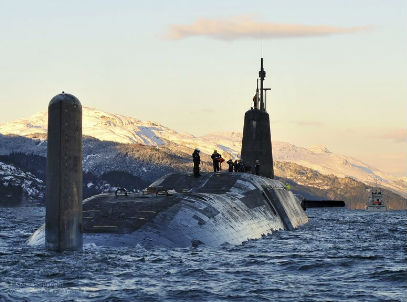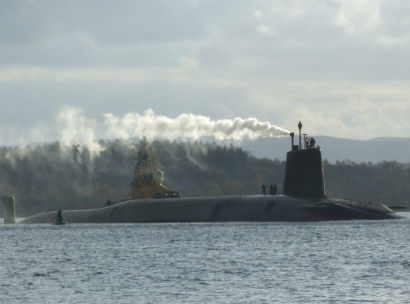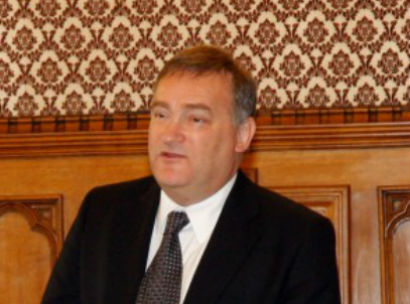 Taken from a House of Commons debate on the progress of defence reform and the Strategic Defence and Security Review on the 26th January.
Taken from a House of Commons debate on the progress of defence reform and the Strategic Defence and Security Review on the 26th January.
Nick Brown (Newcastle upon Tyne East) (Lab): I want us to look again at the case for Britain’s independent nuclear deterrent. I know that that will probably not be popular on either side of the House; others can make their points as the debate progresses. Given the current circumstances, it is time to consider the question again. The Government projects a total cost of £15 billion to £20 billion for the Trident successor programme. Independent research has suggested that the total cost would come in at three or four times that figure and our past experience with such big defence programmes suggests something similar.
Dr Julian Lewis (New Forest East) (Con) rose—
Mr Brown: I remember giving way to the hon. Gentleman the last time I spoke in a debate of this character, back in 2007. I bet his intervention is about the same point.
Dr Lewis: Conservative Members are nothing but consistent on this issue. I remind the right hon. Gentleman that the Polaris fleet and the Trident submarines came into service on time and within budget.
Mr Brown: The hon. Gentleman presumably hopes that that will be the case in the future. However, I challenge him to point to any other defence programme from which he could extrapolate that conclusion. I know that he follows these matters with care, but I cannot think of another programme. He is right to point out the special cases of those procurements in the past, but I am not reassured that they will be repeated in the future. In any event, that point is not at the heart of my case. No matter how one looks at it, this is a very large sum of money to spend. My point is that we should look carefully at whether we should spend it.
The maingate decision on final renewal has been pushed back until after the next general election. The cost of that is said to be an additional £1.5 billion to refurbish and prolong the lifespan of the existing fleet. Parliamentary answers from Defence Ministers show that upwards of £2 billion has already been spent on preparatory work for the manufacture of the new submarines.
The Government clearly intend to press ahead with Trident renewal. In my opinion, they should seek explicit parliamentary authority for doing so. The failure to hold a vote in Parliament on the renewal of our independent nuclear deterrent is because of the inability to reconcile different views in the coalition. The question that faces us is whether an independent nuclear deterrent is a good use of such a large sum of public money in the present circumstances. The arguments, which were never that strong, are now moving away from Trident renewal.
Dan Byles (North Warwickshire) (Con): I am listening with great interest. Does the right hon. Gentleman not agree that a long-term strategic decision, such as the replacement of our nuclear deterrent, should not be taken in the context of the current short-term economic conditions?
Mr Brown: I will come on to deal with that precise point. I have no quarrel with the hon. Gentleman for making it.
The current Trident system relies heavily on US logistical, capacity, technological and military know-how. It is nearly impossible to imagine any circumstances in which we would launch a nuclear attack, much less that we would do so independently of the Americans. Likewise, were Britain to be attacked by a nuclear power, the terms of our membership of NATO would require a joint response by all members, including the US.
Mr Bernard Jenkin (Harwich and North Essex) (Con): Will the right hon. Gentleman give way?
Mr Brown: I cannot give way because of the rules on these things.
NATO is a mutual defence pact. It is a fundamental strength that its armoury includes the nuclear capability of the US. There has always been a question over why Britain needs to duplicate NATO’s nuclear capability, rather than more usefully supplement its conventional capacity.
When I first entered Parliament in 1983, I resisted joining the Campaign for Nuclear Disarmament. I did not support our decision to go ahead with an independent submarine-based system of our own. However, I did support Britain’s membership of NATO, which CND did not. At the time, that was regarded in the Labour party as a very establishment and right-wing position. It is a small irony of Labour politics that the same position is today seen as very left-wing.
When the decision was taken to adopt the Trident system in the early 1980s, there was an understanding that in exchange for non-proliferation by the non-nuclear powers, there would be restraint by the existing nuclear powers, in particular the US and Russia, when it came to further weapons development and upgrades. That idea was enshrined in article VI of the nuclear non-proliferation treaty. It can be argued that that has been more honoured in the breach by countries that did not possess a nuclear capability, but that do now. The underlying principle, however, seems to me still to be sound.
The large financial outlay that the Government are committed to in planning to replace our independent deterrent could be better spent in a number of ways. During the economic boom, I argued that we ought to better equip our troops, invest in the specialist field of anti-terrorism capability in line with the real threats that we face, and supplement our existing overseas aid budget. We now face new threats. To take one example, the money that we spend on Trident could be used to bring down substantially the tuition fees of every student. I think that cutting a generation adrift from higher education poses a bigger threat to our nation than the idea that a foreign power with nuclear weaponry would uniquely threaten to use it against us, and not the rest of NATO, and would somehow be able to disapply NATO’s founding terms. The real nuclear dangers of the future come from rogue states and terrorism. The possession of an independent nuclear deterrent does not make us safer. A better investment would be in anti-terrorism capabilities.
Three main arguments are put forward by proponents of Trident replacement. The first is that it is the best weapon that money can buy. The second is that it guarantees a seat on the United Nations Security Council. The final argument is that it contributes to our ability to punch above our weight in the world. I argue that it is not much of a weapon if the circumstances in which it may be used cannot be envisaged. Fundamental reform of the United Nations Security Council is long overdue and the difficulty, as we all know, is getting agreement on what that reform should be. I also think that other countries might like us more if we stopped punching above our weight in the world. We might be better thought of by the international community if we settled for being the medium-sized European nation state that we are, rather than the imperial power that we used to be.
We have a choice as a country: do we want to continue to drift into spending billions of pounds on supplementing a nuclear capability that we already possess through NATO or do we want to spend that money on tackling the problems that Britain actually faces in squeezed economic times? Surely we should resolve this issue now with a vote in this Parliament.
 The Commons was enlivened by a debate on Trident replacement once again on Monday afternoon as the Defence Secretary was called to the Commons to answer an Urgent Question on his new £1.1 billion contract – heavily trailed in the Sunday press – to redevelop the Rolls-Royce plant at Raynesway in Derby and to produce the reactor for the first of the submarines replacing Vanguard.
The Commons was enlivened by a debate on Trident replacement once again on Monday afternoon as the Defence Secretary was called to the Commons to answer an Urgent Question on his new £1.1 billion contract – heavily trailed in the Sunday press – to redevelop the Rolls-Royce plant at Raynesway in Derby and to produce the reactor for the first of the submarines replacing Vanguard.
















